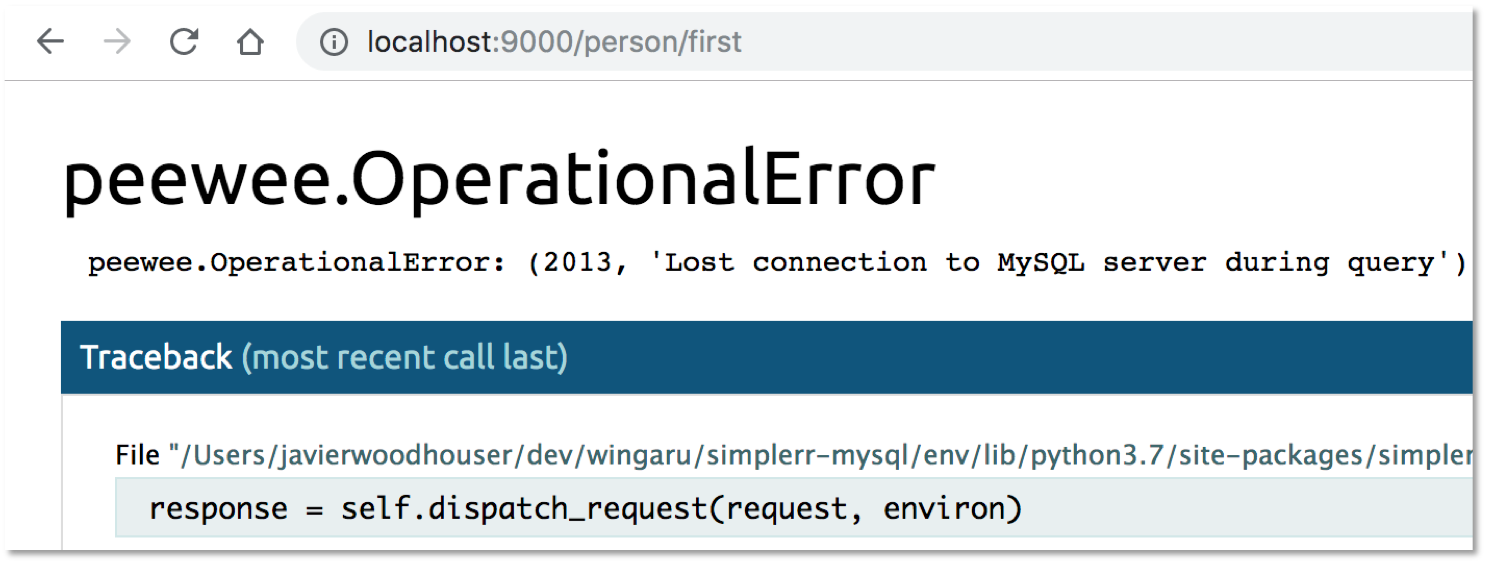Connection strategies for MySQL - robust, simple - but no pooling. If you need pooling can find it in another project which goes into further detail.
To run this project you must first create the following user and schema.
$ mysql -u root -p
mysql> -- Create user with password
mysql> CREATE USER 'simplerr'@'127.0.0.1' IDENTIFIED BY 'pick-password';
mysql> -- Give them some rights - because were going to be testing the stopping
mysql> -- of connections we're going with admin level rights here
mysql> GRANT ALL ON *.* TO 'simplerr'@'127.0.0.1' WITH GRANT OPTION;
mysql> -- Reload grants table without restarting mysql
mysql> FLUSH PRIVILEGES;
mysql> -- Create the schema
mysql> CREATE DB simplerr_schema;
The mysqlclient driver is the preffered database connector for use with simplerr, in extensive testing it has proven to run well in multiple systems, run consistently and updates are frequent.
$ python3 -m venv env
$ source env/bin/activate
(env)$ pip install mysqlclient simplerr
Create a config file to host our database settings. We'll store the connection information in module vairables for use in testing pooled connections later.
# file: website/config.py
from peewee import MySQLDatabase
DB = MySQLDatabase(
'simplerr_schema',
user='simplerr',
password='pick-password',
host='127.0.0.1',
port=3306
)
# file: website/index.py
...
@web('/person/all')
def person_api(request):
return Person.select()
@web('/person/first')
def person_first(request):
return Person.select().get()
If all is successful you should get the following when going to /person/first
However, this can be easily broken - the connection can time out as happens in long running sites, a developer may accidently close the connection, and others. We can similute these events by stopping the connection from mysql.
mysql> show processlist;
+----+----------+-----------------+-----------------+---------+--------+----------+------------------+
| Id | User | Host | db | Command | Time | State | Info |
+----+----------+-----------------+-----------------+---------+--------+----------+------------------+
| 26 | simplerr | localhost:56061 | simplerr_schema | Query | 0 | starting | show processlist |
| 30 | simplerr | localhost:61455 | simplerr_schema | Sleep | 9 | | NULL |
+----+----------+-----------------+-----------------+---------+--------+----------+------------------+
3 rows in set (0.00 sec)
mysql> kill 30;
Query OK, 0 rows affected (0.00 sec)
This needs to be fixed at the application level. We hook into each request before an after. We need to add a minimal try/except as errors on the route may cause the connection to fail to close.
#file: serve.py
....
def connect(request):
try: DB.connect()
except: print("unexpected error in connecting to database")
def close(request, response):
DB.close()
...
wsgi = dispatcher.wsgi(site)
wsgi.global_events.on_pre_response(connect)
wsgi.global_events.on_post_response(close)
wsgi.serve()
Thats it, for a basic website that may be all you need to do. Check out the pooled connection repo for how to handle sites with more loads, and why the design here may have some flaws - although adminittedly simplicity is not one of them.

